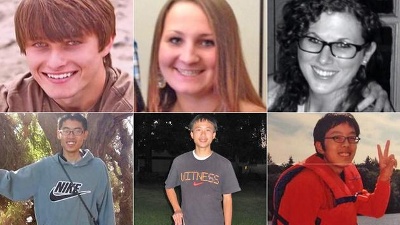Evil Is Not a Mental Illness
 Contrary to popular feel-goodism / we’re-all-somehow-good-people liberal mindsets, evil is not a mental illness. Because so many people willfully blind themselves to this, they wonder how rampages like the recent one at UC Santa Barbara could happen.
Contrary to popular feel-goodism / we’re-all-somehow-good-people liberal mindsets, evil is not a mental illness. Because so many people willfully blind themselves to this, they wonder how rampages like the recent one at UC Santa Barbara could happen.
A young man was mentally ill. He rebuffed people’s friendliness then blamed them for rejecting him. Despite his kind parents’ every attempt to help him, he grew isolated and bitter, a victim consciousness driving him to rage.
It’s not uncommon. As a pastor, I’ve encountered this kind of person many times. I understand such people; I have pity on them and want to help. Sometimes I’ve been able to, and I’ve rejoiced. Other times I’ve not been able to help, and I’ve grieved for them and for the people around them who hurt.
But when that mentally ill person writes a 137 page document detailing what he calls his “Day of Retribution” against the world and that he would start by killing his three bright and innocent roommates to “secure the entire apartment for myself as my personal torture and killing chamber,” then drives off in his BMW on a shooting and running-people-over rampage that kills three more innocent young people and injures many others–that person crosses a huge line from the victimhood of mental illness to the outright perpetration of evil. Can any clear-minded person deny that?
Dr. Theodore Dalrymple, an esteemed British psychologist, challenges the mental health world’s recent creation of “Intermittent Explosive Disorder,” a new mental disorder. He writes, “A description of bad behavior is not the same as a mental illness. . . . Is the habit of losing one’s temper and destroying things or hurting people really a medical condition? Doesn’t the diagnosis empty the act both of meaning and moral content, all in the service of a spurious objectivity?” (LA Times 11/5/2013).
Right on, Doctor. A voice of common, and educated, sense in the midst of wishful nonsense.
Be baffled by evil if you like. But we’re naive to assume that evil thinking and behavior is all about mental illness. If that were the case, the country would be rampaged by countless people every day. And we’re fooling ourselves to think that spiritual forces of evil–demons and the like–do not influence people to do unthinkable things.
Mentally ill people can be victims on two levels: physiological and spiritual. But the step to being victimizer of innocent people always involves the choice of enacting evil.
This is not meant as an attack on the perpetrator but rather as a shout to those of us who hide dark realities behind wishful denial. There is a time for grief and mourning. But to combat evil, we must first acknowledge it.
—
Photo credit: www.keyt.com







